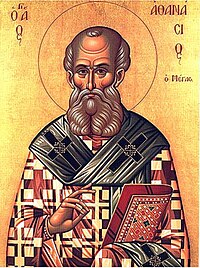As Christmas inches ever closer (less than a week away, now!), I find myself constantly swept up in the miracle and mystery of the incarnation. It is, in my opinion, the defining aspect of our faith and the key part of the salvific narrative.
So as I was reading Athanasius's
On the Incarnation, I realized he had not had his own Theologian Thursday post yet! So here we are.
Athanasius was the bishop of Alexandria, and is most well known for his opposition to the Arian heresy and his role at the councils of Nicaea (325) and Alexandria (326).
The gist of the story is that Arius was teaching a subordinationist christology (i.e. that the second Person of the Trinity was created in time, rather than begotten eternally), which had actually taken off and become quite popular. In fact, this may be the only historical heresy with an accompanying jingle--people were going around singing, "There was a time when the Son was not." Athanasius challenged Arius, asserting that the Son could not have been created, because then it would be
creature and not divine.
Then he got Arius anathemized.
Athanasius was not without his own problems though. He was sent into exile a couple times, mostly because emperors were mad about the Arius thing. This was right after Constantine adopted Christianity and the Church began to be entangled with the Empire, so clergy had become more political. Athanasius did most of his writing while in exile.
What you should read:
Ratings:(To read more about my rating system, click HERE.)
Gender Equality: 
 I don't think I would call Athanasius a total misogynist, but he does pen some questionable lines about women and sin, and the necessity of the virginity of Mary. Plus, there's not much to say that he actually appreciated women.
Environmental Sensibility:
I don't think I would call Athanasius a total misogynist, but he does pen some questionable lines about women and sin, and the necessity of the virginity of Mary. Plus, there's not much to say that he actually appreciated women.
Environmental Sensibility: 
 The fourth century was certainly not a time of much interest in the environment. And yet, these early fathers were not destroying the earth as humanity came to do later either, so I suppose there was less to worry about.
Heretical Tendencies:
The fourth century was certainly not a time of much interest in the environment. And yet, these early fathers were not destroying the earth as humanity came to do later either, so I suppose there was less to worry about.
Heretical Tendencies: 
Athanasius's fight was for orthodoxy, and his christology and view of the Trinity is still considered orthodox today. Interesting how a "winner" in a doctrinal debate automatically becomes 100% orthodox, while the other is 100% heretical and has his work burned.
General Badassery: 

I was actually surprised to find Athanasius to be a lot less badass than I was expecting. Besides the anathemizing and exiles and writing, his life was not really a big deal. He died peacefully in his home at a very old age. Oh, and his nickname was the "Black Dwarf," which is not so much badass as it is politically incorrect.
Finally, a classic quote:
"The Son of God became man so that we might become God."




